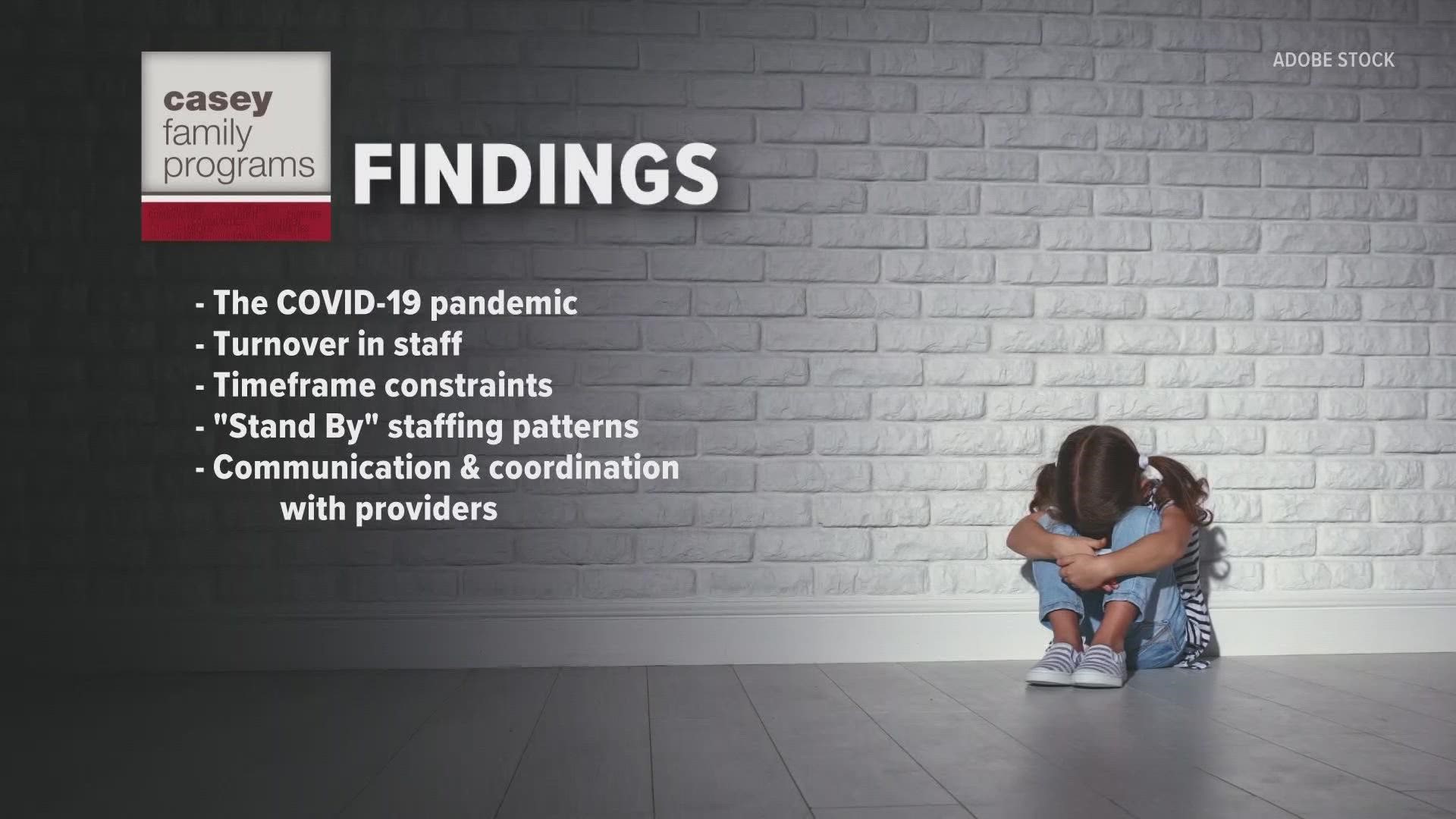AUGUSTA, Maine — The Maine Department of Health and Human Services released the report from an independent agency the state hired to review and recommend changes to the state's child welfare system.
Maine DHHS hired Casey Family Programs in June 2021 after five children died in Maine in that month alone.
The report from CFP found eight key findings:
- The Impact of the Covid-19 Pandemic
- The Contribution of Turnover
- The Constraints of Timeframes
- Standby Staffing Patterns
- Communication and Coordination with Providers
- Difficulty Engaging Caregivers
- Family Team Meeting Coordination
- Communication between Partners: Law Enforcement & Hospitals
COVID-19 forced staff to quarantine, shifting their work onto others. Staffing was already short, making that problem worse.
Turnover also led to high workloads, as new staff had to take on more cases from those who left. Those overwhelming workloads led to more people leaving, and the process snowballing.
That meant staff did not "meet important expectations" according to the report, such as contacting children and families, and focusing only on the highest risk or more manageable cases.
The report found supervisors struggled to support their staff.
Time was another major problem staff referenced to investigators. They said cases had to be assessed within 35 days.
Staff told investigators that these days, the amount of work they are expected to complete in cases has gradually increased over time, without adjustments to that 35-day timeframe.
Staff said that time crunch made them feel they do not have the "time they need to complete all tasks or have meaningful impact with the families they support."
Case workers are also assigned to "standby shifts," essentially, after-hours on-call work.
The report says staff were assigned to the cases without much attention to their level of experience or the severity of the cases, and that staff were unfamiliar with each other.
Communication was a big problem, too.
The report found health care workers helping parents with mental health or substance abuse problems were less likely to coordinate with child welfare staff. That means families were not helped in a holistic way.
Many families also did not want to interact with the child welfare case workers.
Families are not forced to meet with case workers unless a court order is involved, leading some case workers to feel hopeless when working with resistant families.
Another communication problem is between law enforcement, and hospitals.
The report found hospital staff are less likely to share information with officers due to fear of HIPAA violations, leading to only vague information for officers to pass on to case workers.
From those findings, CFP issued several recommendations:
- It is recommended that OCFS work with a coalition of providers to support effective coordination with child welfare staff (e.g., supporting families, court and Family Team Meeting participation, sharing information, etc.) and address any identified barriers.
- It is recommended that OCFS establish joint protocol agreements between Law Enforcement, Hospitals and Child Welfare staff when there is suspected abuse or neglect to support communication and coordination.
- It is recommended that OCFS explore ways to support consistent practices, including role clarity and ongoing support for Family Team Meetings.
- It is recommended that OCFS explore ways to support engagement between parents and the child welfare system, such as parent partner/parent mentor programs.
- It is recommended that OCFS continue to examine national best practices regarding standby and after-hours practices.
- It is recommended that OCFS examine national best practices for assessment timeframes and ensure that whatever timeframe is selected, it is compatible with the expected workload.
- It is recommended that OCFS conduct an analysis of current work tasks required in an assessment and remove any unnecessary and/or redundant tasks.
“We remain committed to learning all we can from these tragic deaths and taking action to help Maine children grow up safe, healthy, and loved,” Maine DHHS Commissioner Jeanne Lambrew said in a release Thursday. “Casey Family Programs brought a wealth of experience and national perspective to this thorough review and we are comprehensively evaluating their recommendations to identify steps we can take immediately and over the long-term to protect Maine children.”
Maine DHHS said it is closely reviewing the report’s seven recommendations.
“The heartbreaking deaths of these children continue to be felt among their families, their communities, our staff, and our state as a whole,” Todd Landry, director of the Maine DHHS Office of Child and Family Services, said in a release. “Casey’s expert review will help us work with our partners throughout the child welfare system to keep children safe and support Maine families now and into the future.”
Senator Bill Diamond (D - Cumberland), who has been leading the charge on overhauling the state's child welfare system said he was disappointed by the report and its findings.
"In looking through the recommendations, I've not seen anything there that really addresses these kinds of problems. They're having a really casual approach to address really very serious problems," said Sen. Diamond. "I am not a totally negative about their report. I think it's a good step it's a good set of these recommendations if they are completed, both through I think it will improve the system. I just don't think they, they got into the hardcore problems that addressed this, that are in this department which I wish they had."
Read the full report from Casey Family Programs
EDITOR'S NOTE: The video below aired June 24, 2021.

